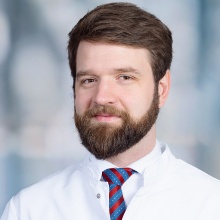Kontakt
Hoppe-Seyler-Str. 3
72076 Tübingen
Deutschland
Fachgebiet
Presentations at Meetings
AUA 2017
Harland, N., Sipos, B., Hennenlotter, J., Amend, B., Scharpf, M., Stenzl, A., & Bedke, J. (2017). MP64-17 REDUCTION OF POSITIVE SURGICAL MARGINS DUE TO A SIMPLIFIED NEUROSAFE TECHNIQUE. The Journal of Urology, 197(4S), e851-e851.
DGU 2018
Erste Ergebnisse der roboter-assistierten transperinealen MRT/TRUS- Fusionsbiopsie. Die Retzius sparende robotisch assistierte radikale Prostatektomie durch einen subtrigonalen Zugang führt zu besseren funktionellen und onkologischen Ergebnissen
AUA 2019
Harland, N., Russo, G. I., Mathes, J., Rausch, S., Neumann, E., Kaufmann, S., ... & Kruck, S. (2019). MP13-13 ROBOTIC TRANSRECTAL COMPUTED TOMOGRAPHIC ULTRASOUND WITH ARTIFICIAL NEURAL NETWORK ANALYSIS–FIRST VALIDATION AND COMPARISON WITH MRI-GUIDED BIOPSIES AND RADICAL PROSTATECTOMY. The Journal of Urology, 201(Supplement 4), e182-e182.
DGU 2019
Die All-in-one-Naht, eine Technik zur Lymphozelenvermeidung bei der retzius-sparenden Prostatektomie mit pelviner Lymphadenektomie
Die optimale Stanzzylinder-Zahl, wie viele sind notwendig bei der MRT-gezielten Prostatabiopsie? Robotische Computertomographie mittels transrektalem Ultraschall mit artifiziellem neuronalen Netzwerk - Erste Validierung anhand von MRT gesteuerter Biopsie und radikaler Prostatektomie.
2023
- P. Somers et al., “Cystoscopic depth estimation using gated adversarial domain adaptation,” Biomedical Engineering Letters, vol. 13, Art. no. 2, May 2023, doi: 10.1007/s13534-023-00261-3.
2022
- I. A. Montes-Mojarro et al., “Multiparametric Classification of Non-Muscle Invasive Papillary Urothelial Neoplasms: Combining Morphological, Phenotypical, and Molecular Features for Improved Risk Stratification,” International Journal of Molecular Sciences, vol. 23, Art. no. 15, 2022, doi: 10.3390/ijms23158133.
- N. Harland et al., “Elevated Expression of the Immune Checkpoint Ligand CD276 (B7-H3) in Urothelial Carcinoma Cell Lines Correlates Negatively with the Cell Proliferation,” International Journal of Molecular Sciences, vol. 23, Art. no. 9, 2022, doi: 10.3390/ijms23094969.
- P. Somers et al., “Growth of Simulated Tumors Under the Influence of Oxygen Supply,” IFAC-PapersOnLine, vol. 55, Art. no. 20, 2022, doi: 10.1016/j.ifacol.2022.09.170.
- L. Becker et al., “Data-Driven Identification of Biomarkers for In Situ Monitoring of Drug Treatment in Bladder Cancer Organoids,” International Journal of Molecular Sciences, vol. 23, Art. no. 13, 2022, doi: 10.3390/ijms23136956.
- C. Veil et al., “Electro-Mechanical Coupling in Impedance-Based Tissue Differentiation Under Compression\ast,” IFAC-PapersOnLine, vol. 55, Art. no. 20, 2022, doi: 10.1016/j.ifacol.2022.09.155.
- R. Geng et al., “CD24: A Marker for an Extended Expansion Potential of Urothelial Cancer Cell Organoids In Vitro?,” International Journal of Molecular Sciences, vol. 23, Art. no. 10, 2022, doi: 10.3390/ijms23105453.
- Y. Wei et al., “Urinary Tract Tumor Organoids Reveal Eminent Differences in Drug Sensitivities When Compared to 2-Dimensional Culture Systems,” International Journal of Molecular Sciences, vol. 23, Art. no. 11, 2022, doi: 10.3390/ijms23116305.
2021
- N. Harland and A. Stenzl, “Micro-Ultrasound: a way to bring imaging for prostate cancer back to urology,” Prostate International, vol. 9, Art. no. 2, Jun. 2021, doi: 10.1016/j.prnil.2020.12.002.
- N. Harland et al., “Organoide zur Weiterentwicklung der intraoperativen Diagnostik,” Der Urologe, vol. 60, Art. no. 9, Sep. 2021, doi: 10.1007/s00120-021-01595-5.
Education
Residency: 06/2014 – 10/2019, Department of Urology, University Hospital Tübingen, (Prof. Dr. med. Dr. hc. Arnulf Stenzl)
Doctoral thesis: 04/2012 – 08/2017, Entwicklung und Validierung eines Algorithmus zur automatischen Berechnung der autonomen Funktion des Herzens (Prof. Dr. med. Axel Bauer)
Medical School: 04/2008 – 05/2014, Eberhard Karls University Tübingen
Working Experience
Senior physician:
11/2019 – currently: Department of Urology, University Hospital Tübingen, (Prof. Dr. med. Dr. hc. Arnulf Stenzl)
Research Grant
04/2020 – 10/2021: Clinical scientist at the Graduiertenkolleg 2543: Intraoperative multisensorische Gewebedifferenzierung in der Onkologie, (Intraoperative multisensoric diffentiation of tissue in oncology), Deutsche Forschungsgemeinschaft
Reviewer
World Journal of Urology
European Urology Focus





